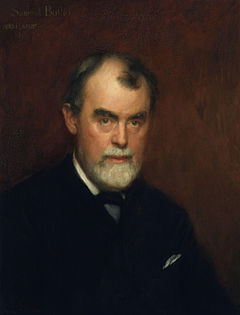December 4: Samuel Butler
Samuel Butler (1835)
It was on this date, December 4, 1835, that British writer Samuel Butler was born in Upton upon Severn in Langar Rectory, near Bingham, Nottinghamshire, England. Being the son and the grandson of clergymen, Butler began to study along the same lines, but in 1859 he refused to be ordained, traveled to New Zealand, and established a sheep farm with some success. He returned to London in 1864 and, while dabbling in music, biology and painting — he exhibited some of his paintings at the Royal Academy (1868-76) — took to literature. He published his first novel, Erewhon, (the title is the word "nowhere" spelled backwards) in 1871.
Erewhon, at first published anonymously, made Butler's reputation. In it he skewered the churches, but also attacked the theory of evolution, chiefly because Butler felt Darwin had not given his grandfather, Erasmus Darwin, enough credit. There followed brilliantly witty satirical works, such as The Fair Haven (1873) and his criticism of Victorian society, The Way of All Flesh (posthumous, 1903). Butler also translated the classical Greek Iliad and Odyssey.
In his works he scarcely disguised his criticisms of Christianity, although he held the belief that there was an impersonal mind or purpose directing the universe. He once said, "An honest God's the noblest work of man," spoofing Alexander Pope's line, "An honest man's the noblest work of God." And in an essay called "Unprofessional Sermons" from his Note-Books, Butler wrote, "Prayers are to men as dolls are to children. They are not without use and comfort, but it is not easy to take them very seriously."
Samuel Butler (not to be confused with the Samuel Butler who wrote the satirical poem "Hudibras") died on 18 June 1902. In The Way of All Flesh, Butler wrote, "A clergyman can hardly ever allow himself to look facts fairly in the face. It is his profession to support one side; it is impossible, therefore, for him to make an unbiased examination of the other."
NB: The text of Butler's Erewhon The Way of All Flesh and The Fair Haven can be found through the Project Gutenberg site.
Originally published December 2003.


